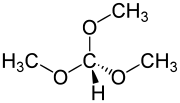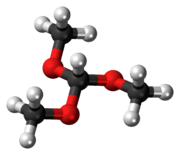Trimethyl orthoformate
 | |
 | |
| Names | |
|---|---|
| IUPAC name
Trimethoxymethane | |
| Other names
2-Methoxyacetaldehyde dimethyl acetal; Methoxymethylal; Methyl orthoformate | |
| Identifiers | |
| 149-73-5 | |
| ChemSpider | 8655 |
| Jmol interactive 3D | Image |
| PubChem | 9005 |
| |
| |
| Properties | |
| C4H10O3 | |
| Molar mass | 106.12 g·mol−1 |
| Appearance | Colorless liquid |
| Density | 0.97 g/mL |
| Melting point | −53 °C (−63 °F; 220 K) |
| Boiling point | 101 to 102 °C (214 to 216 °F; 374 to 375 K) |
| Hazards | |
| R-phrases | R11 R36 |
| S-phrases | S9 S16 S26 |
| Flash point | 13 °C (55 °F; 286 K) |
| Except where otherwise noted, data are given for materials in their standard state (at 25 °C [77 °F], 100 kPa). | |
| Infobox references | |
Trimethyl orthoformate is the simplest orthoester. It is a reagent used in organic synthesis for the introduction of a protecting group for aldehydes. The product of reaction of an aldehyde with trimethyl orthoformate is an acetal. In general cases, these acetals can be deprotected back to the aldehyde by using hydrochloric acid.
The industrial synthesis of this chemical is from hydrogen cyanide and methanol.[2]
Trimethyl orthoformate is a useful building block for creating methoxymethylene groups and heterocyclic ring systems. It introduces a formyl group to a nucleophilic substrate, e.g. RNH2 to form R-NH-CHO, which can undergo further reactions. It is used in the production of the fungicides, azoxystrobin and picoxystrobin, as well as for some members of the floxacin family of antibacterial drugs. A number of pharmaceutical intermediates are also made from trimethyl orthoformate.[2]
See also
References
- ↑ Trimethyl orthoformate at Sigma-Aldrich
- 1 2 Ashford's Dictionary of Industrial Chemicals, Third edition, 2011, ISBN 978-0-9522674-3-0, page 9388